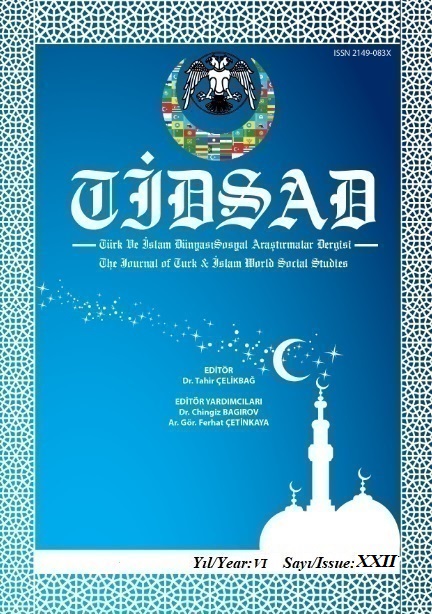Author :
Abstract
“Lili” ismi kelime anlamı itibariyle Fransızcada zambak, nâzik, lekesiz, pak ve tertemiz anlamlarına gelmektedir. Bu manasıyla şiire ve içinde bulunan karaktere uymaktadır. Bugüne kadar birçok tanımı yapılmış olan aşk Sezai Karakoç’ta maddeden ayrı olarak lekesiz, nazik, tertemizdir. Aynı zamanda yazıldığı dönem itibariyle Sezai Karakoç’un ruh dünyasının özetidir. Bu şiir bu vesileyle ortaya çıkmıştır. Sinema sanatının Muhsin Ertuğrul’un etkisinde şekillenen döneminde 1953 yapımı Lili adlı filmi izleyen şair, bu şiiri kaleme almıştır. Bu vesile ile sinema sanatının şiiri etkilemesi hususunda örnek bir çalışma ortaya koymuştur. Filmin şiirselleştirildiği edebi bir eser meydana gelmiştir. “Lili” şiiri, Sezai Karakoç’un “Mona Roza” ile başlayıp “Pinpon Topu” ile devam eden aşk şiirlerinin devamı niteliğindedir. Bu şiir şairin gençlik dönemi şiirlerindendir. Bu dönemde modern bir tavır sergileyerek evrensel değer olan aşk, şiirin öznesi olan Lili ile Sezai Karakoç’un ilişkisi, şiirin bitiş dizesidir.
Keywords
Abstract
The word "Lili" is literally meaning lily, gentle, spotless, immaculate and very clean in French. This follows the character of the poetry and the character in it. The love that has been described so far is now spotless, gentle, immaculate apart from the material in Sezai Karakoç. It is also the outline of Sezai Karakoç's soul world as of the writing period. This poetry came into being by this means. The poet, who followed the 1953 film Lili in the time when the art of cinema was still showing up in our country, received this poem. Hereby, we have presented an exemplary study on the effect of cinema art on poetry. A literary work poetized by cinema has come to fruition. The poem "Lili" is the continuation of the love adventure that begins with Sezai Karakoç's "Mona Roza" and continues with "Pin Pon Ball". This poem is one of poet's poetry in youth. The relationship between Lili and Sezai Karakoç, the universal value of love and poetry, exhibiting a modern attitude in this period is the end of poetry.
Keywords
- Virginia Woolf (1950). “The Captain’s Death Bed”. Çev. Meltem Ahıska (1995). “Kaptanın Ölüm Döşeği”, Kinema, S. 3), s. 61. Özlem KALE, Uluslararası Sosyal Araştırmalar Dergisi The Journal of International Social Research Volume: 3 Issue: 14 Fall 2010 Edebiyat Sinema ilişkisi The Relationship between Literature and Cinema
- Karakoç Sezai, Fikir ve Sanat Hayatı, Mülkiye, 1953,S.12.
- TOSUN Necip, Bir Şiir: Lili, Bir Film: Lili, Dergah Yayınları, 2005, S 78,79.
- Karakoç Sezai, Edebiyat Yazıları II, Diriliş Yayınları, 1986, S. 60,61.
- Kabaklı Ahmet, “Sezai Karakoç II: Diriliş Gelenek ve Şiir”, Türk Edebiyatı,Temmuz 1991,S.213.
- Satıcı Adnan, Cansever ve Karakoç’ta Kültürel Yönelim, Broy,1989,S.34.
- Süreyya Cemal, 99 Yüz, Yapı Kredi Yayınları, 2010, S.308.
- Oktay Ahmet, “Umut ve Olanaksızlık:’Çağdan Çıkarma’ Oyunu”,Gösteri, Mayıs 1993, S.150.
- Bayazıt Erdem, ”Sezai Karakoç’un Şiirlerine Giriş”,Deneme, Mayıs 1972, S.13.
- Karataş Turan, doğu’nun yedinci oğlu Sezai Karakoç, Kaknüs Yayınları, 1998, S.353.
- Karataş Turan, doğu’nun yedinci oğlu Sezai Karakoç, Kaknüs Yayınları, 1998,S.343.
- Karakoç Sezai, Gün Doğmadan, Diriliş Yayınları, 2016, S.51-52.
- Giovanni Scognamillo, Türk Sineması Tarihi, Kabalcı Yayınları , 2010, s.131





